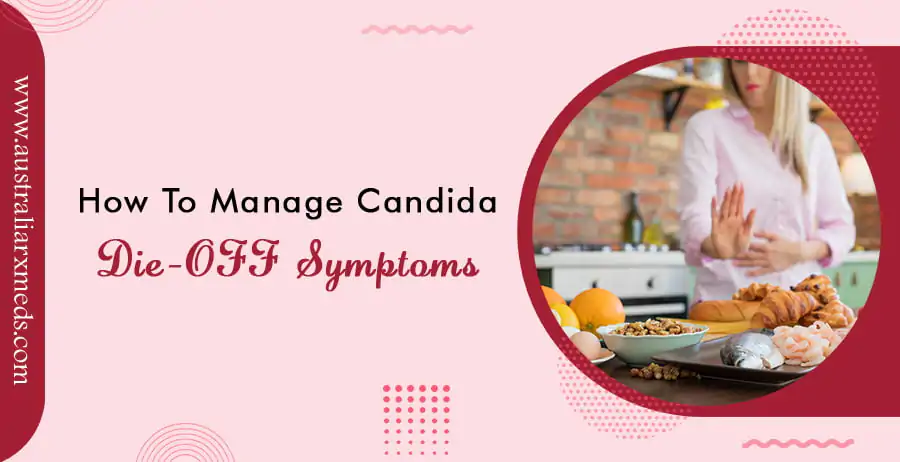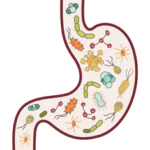How to Manage Candida Die-Off Symptoms
By Australiarxmeds, Jan-02-2024

Introduction:
Candida, a type of yeast that naturally resides in the human body, plays a vital role in digestion and nutrient absorption. Meet Candida, a friendly yeast in our bodies that aids digestion.
Sometimes, it gets overly active, causing health issues. Managing Candida overgrowth involves addressing symptoms during the die-off process. Discover how to keep this helpful yeast in check for a healthier balance and improved well-being.
Understanding Candida Die-Off:
◾ Candida Die-Off occurs when the body is eliminating excess yeast. This process can trigger a range of symptoms, such as fatigue, headaches, and digestive issues. It is important to recognize these symptoms as signals that the body is actively working to restore balance.
◾ By understanding what happens during Candida die-off, individuals can better navigate this phase of their health journey. Cenforce boosts a man’s confidence and alleviates concerns related to sexual performance.
Duration of Candida Die-Off:
◾ When you are dealing with Candida die-off, which is when your body is getting rid of extra yeast, the uncomfortable part usually only lasts from 3 to 10 days. This is because your body is busy getting rid of something called endotoxins during this time.
◾ Even though it might feel a bit tricky with the symptoms, like feeling tired or having a tummy ache, it is good to know it will a short period. Think of it like a quick step your body takes to feel better overall. As your body clears out these endotoxins, you might start feeling more energetic, and your symptoms could go away. So, even though it might not feel great for a little while, it is like your body’s way of getting back to its happy and healthy self!
Candida Die-Off Symptoms:
◾ Experiencing Candida Die-Off symptoms can be a bit like a puzzle, where your body is working hard to get rid of extra yeast. These symptoms might include feeling a bit fuzzy in your brain, having a headache, or experiencing tummy troubles like bloating or gas.
◾ You might also feel tired and a little irritable, like when you have a bad day. Some other things that could happen are Dizziness, sweating more, or even having a slight fever. Your nose might feel stuffy, and your throat could be a bit sore.
◾ Sometimes, your skin might break out or get itchy, and you might have trouble sleeping. It is like your body is going through a bit of a rollercoaster, but hang in there! These symptoms usually don’t last too long, and your body is just working to feel better in the end.
Causes of Candida Overgrowth:
◾ Candida overgrowth happens when there is too much of a certain type of yeast in our bodies. Here are some things that can make it more likely to happen:
➥ Poor Dietary Choices:

Eating too much sugary stuff and processed foods can make Candida grow faster. It is like giving it the perfect environment to thrive in, and that’s not good for our tummies. Fildena contributes to improving sexual performance and satisfaction.
➥ Imbalance in Gut Bacteria:

Our tummies are like a tiny universe with lots of good and bad bacteria. When there is an imbalance, meaning too much of the bad stuff, Candida can take advantage and grow more than it should.
Ways to Manage Candida Die Off:
◾ Navigating Candida die-off? Explore practical ways to ease symptoms. From Diet choices to self-care, discover effective strategies for a smoother journey.
➥ Healthy Dietary Choices:
Eating the right foods can help manage Candida symptoms! Veggies, lean proteins, and whole grains keep your tummy happy. Try yogurt for good bacteria. Learn to Make Yummy, Healthy Choices for a Happy and Balanced Body!
➥ Hydration and Detoxification:
Staying adequately hydrated is essential during the Candida die-off process. Drinking lots of water is crucial during Candida die-off! Water helps remove icky toxins, helping your body clean up. Remember to sip water all day—it’s like giving your body a big, refreshing hug. And if you ever hear about detox, just know it’s about taking it slow and gentle, like a cozy stroll, not a sprint. Your body will thank you for treating it kindly!
➥ Stress Management:
Stress can make it worse for Candida overgrowth, making it essential to address stress as part of symptom management. Did you know stress can make Candida issues worse? Managing stress is like having a superpower! Try fun stuff like deep breathing or just enjoying what you love. Knowing how stress affects you helps create cool strategies for a happy, balanced life. You’re in charge of your superhero stress-busting team!
➥ Adequate Sleep:
The role of sleep in managing Candida die-off symptoms should not be underestimated. Quality sleep allows the body to regenerate and repair itself. Establishing Healthy Sleep Habits, such as maintaining a consistent bedtime routine and limiting screen time before bed, contributes to overall well-being. Adequate rest supports the body’s immune system and aids in the recovery process during Candida die-off.
➥ Physical Activity:
Incorporating age-appropriate physical activity into daily routines is another key aspect of managing Candida-related symptoms. Exercise helps improve circulation, boost the immune system, and support overall health. Encouraging activities that young individuals enjoy, such as playing sports or engaging in outdoor games, promotes a positive attitude toward maintaining an active lifestyle. Vidalista works by increasing blood flow and helping men achieve a great bedroom experience.
Conclusion:
◾ In conclusion, managing Candida die-off symptoms involves a holistic approach that considers various aspects of one’s lifestyle. By understanding the causes of Candida overgrowth, making healthy dietary choices, staying hydrated, managing stress, prioritizing sleep, and incorporating physical activity, individuals can support their bodies during this natural healing process.
◾ It is crucial to emphasize that these lifestyle changes contribute not only to managing immediate symptoms but also to long-term health and well-being.
◾ Encourage young readers to approach their health journey with curiosity and a willingness to make positive choices. Always consult with a Healthcare Professional for personalized advice and guidance on managing Candida-related symptoms.

